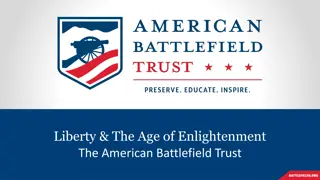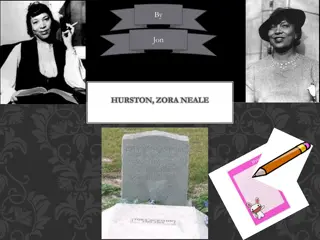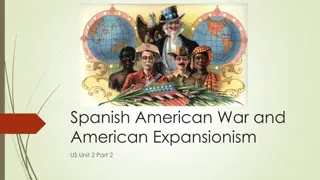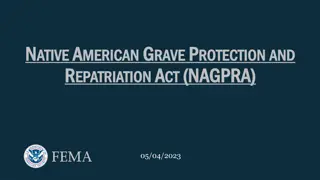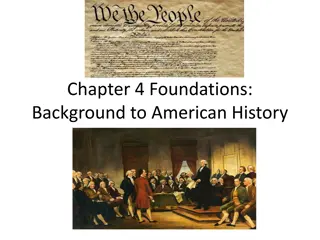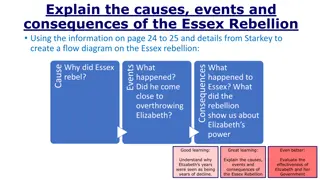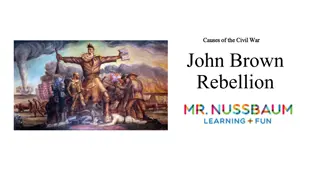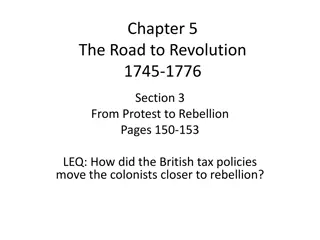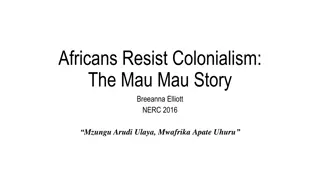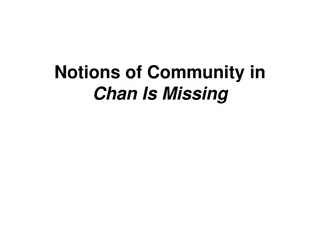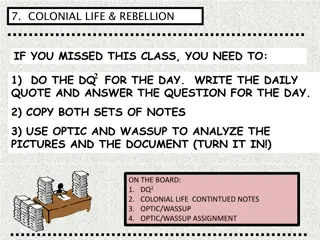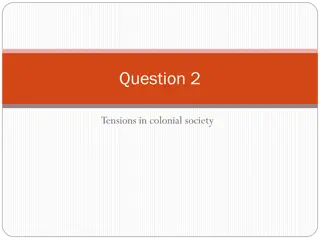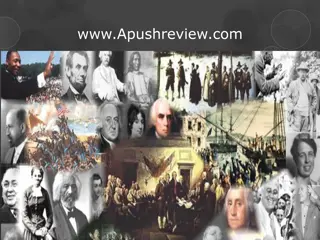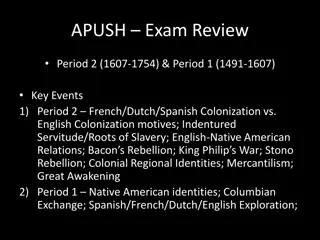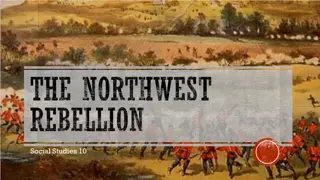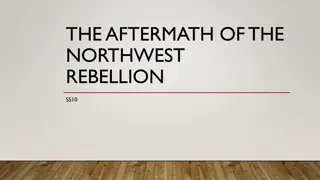Liberty & The Age of Enlightenment The American Battlefield Trust
The Age of Enlightenment, with its emphasis on natural law, liberty, progress, and constitutional government, greatly influenced American thinking and the Revolutionary War. Key figures like John Locke and Sir William Blackstone contributed ideas of social contract and law that shaped American gover
2 views • 15 slides
The Cosmic Conflict: Origins of Rebellion in Heaven
Immersed in a conflict of cosmic proportions, the story of rebellion in heaven unfolds through the fall of Lucifer, now Satan, who led a third of the angels in defiance against God. This eternal battle between good and evil continues to impact our choices and allegiances today, reminding us of the i
2 views • 11 slides
Zora Neale Hurston: African-American Writer of the Harlem Renaissance
Zora Neale Hurston, born in Notasulga, Alabama, in 1891, was a prominent African-American writer known for her works reflecting the African-American culture and folklore. Growing up in Eatonville, Florida, and later studying at Barnard College, she stood out among her contemporaries for her portraya
2 views • 4 slides
Intrigue and Rebellion in Mrichchhakatika
The play "Mrichchhakatika" unfolds a tale of love, betrayal, and societal norms through its main plot involving Charudatta and Vasantasena, as well as a subplot featuring Madanika and Sharvilaka. Acts III and IV depict the making of a breach as characters navigate themes of freedom, theft, and defia
0 views • 7 slides
Overview of AANAPISI Program in the United States
The Asian American and Native American Pacific Islander Serving Institutions (AANAPISI) Program aims to support institutions with a minimum of 10% Asian American and Native American Pacific Islander undergraduate enrollment. Currently, there are 54 funded AANAPISI institutions across 16 states and t
0 views • 13 slides
Analyzing Patrick Henry's Rhetorical Strategies
Explore the effective use of rhetoric by Patrick Henry in his speech to ignite rebellion during the American Revolution. The analysis focuses on his use of allusion, metaphor, and powerful language to convince delegates to engage in war against England.
0 views • 8 slides
Evolution of American English Vocabulary and Language Features
American English exhibits arachaic features and early changes in vocabulary due to colonial influences and the distinct political and administrative system. The language has preserved old-fashioned elements from the seventeenth and eighteenth centuries, while also incorporating new words inspired by
0 views • 5 slides
Exploring the 1798 Irish Rebellion through Creative Classroom Activities
Dive into the events of the 1798 Irish Rebellion through engaging classroom activities such as drawing historical scenes, reading stories, answering questions, and interacting with classmates. Uncover different perspectives, key figures, movements for reform, and the challenges faced during this sig
0 views • 46 slides
Spanish-American War and American Expansionism: A Look Back in History
Explore the causes and impacts of the Spanish-American War, including the influence of Yellow Journalism, nationalism, and imperialism on American expansionism during the late 1800s. Learn about key figures like Theodore Roosevelt and the Rough Riders, and the significance of policies like the Monro
0 views • 25 slides
Cultural Awareness for Drug Courts Working with Native American Participants
Understanding the cultural nuances of Native American communities is crucial for Drug Courts collaborating with Tribal Healing to Wellness Courts. This involves acknowledging tribal sovereignty, regional and cultural differences, customs, spirituality, and communication styles unique to American Ind
0 views • 22 slides
Native American Repatriation and NAGPRA Overview
The Native American Graves Protection and Repatriation Act (NAGPRA) enacted since November 1990 establishes ownership of cultural items excavated on Federal or Tribal land. It requires returning such items to Native American descendants and affiliated tribes. The Act also criminalizes trafficking in
1 views • 8 slides
Unveiling the French and Indian War
Trouble arose as Native Americans contested British control, leading to the Proclamation of 1763 restricting colonial settlement. Resentment grew, fueling Pontiac's Rebellion where various tribes, led by Pontiac, fought British forces. Native American warriors attacked forts and colonists, capturing
0 views • 17 slides
Evolution of Governance in the United States: Shays' Rebellion to the Constitutional Convention
Shays' Rebellion, led by Daniel Shays in 1786-1787, highlighted the weaknesses of the Articles of Confederation, prompting the Constitutional Convention in 1787. Despite challenges and delays, key figures like James Madison and George Washington played significant roles in shaping the new governance
0 views • 11 slides
American Revolutionary Era: Key Events and Figures
The American Revolutionary Era marked by the formation of the Constitution, Washington's militia, key figures like Jonathan Trumbull and John Peter Muhlenberg, the emergence of American culture, the Articles of Confederation, and calls for a stronger government. This period saw a shift towards a mor
0 views • 17 slides
Analysis of Sammy in "A&P" by John Updike
In John Updike's "A&P," Sammy is depicted as a complex character who exhibits traits of boredom, insecurity, and impulsiveness. Various interpretations describe him as a typical American male with good intentions, insecure and unsure of himself, and a young, rash teenager. The story explores themes
0 views • 16 slides
Understanding the Essex Rebellion and Elizabethan Decline
Explore the causes, events, and consequences of the Essex Rebellion and evaluate its impact on Elizabeth and her government, shedding light on why the final years of Elizabeth's reign were viewed as a period of decline. Delve into societal changes, living standards, and cultural advancements during
0 views • 20 slides
The Impact of the Red River Rebellion on Canadian History
The Red River Rebellion of 1869-1870 marked a pivotal moment in Canadian history, with Louis Riel leading the Metis in establishing a provisional government in response to fears of losing their power to settlers. John A. MacDonald's response, the execution of Thomas Scott, and the aftermath of Scott
0 views • 10 slides
Washington Irving: Father of American Fiction and Pioneer of American Romanticism
Washington Irving, an influential American author of the early 19th century, is revered as the Father of American fiction. Known for iconic works like "The Legend of Sleepy Hollow" and "Rip Van Winkle," Irving played a crucial role in establishing American literature as an independent art form. His
1 views • 14 slides
John Brown's Role in Escalating Tensions Towards the Civil War
Explore John Brown's pivotal role in the lead-up to the Civil War through his radical abolitionist actions, including the violent events in Bleeding Kansas and his infamous raid on Harper's Ferry. Brown's staunch anti-slavery stance and militant tactics further polarized the nation on the issue of s
0 views • 9 slides
Insights into the Teen Film "Grease" - Characters, Plot, and Themes
Grease", released in 1978, remains a classic teen film known for its musical, romantic comedy elements. The story revolves around characters like Danny, Sandy, and the T-Birds, focusing on themes of love, rebellion, and comedy. With a linear narrative structure, the film showcases high school life,
0 views • 9 slides
Journey from Rebellion to Restoration: A Biblical Reflection
Explore the stages of rebellion, ruin, realization, and rewards on the path to restoration as depicted in biblical teachings. From self-will and selfishness to repentance, reconciliation, and experiencing the love of God, this insightful reflection offers guidance on spiritual transformation and gro
0 views • 4 slides
Causes of Colonists' Rebellion: British Tax Policies
British taxation policies, including the Tea Act of 1773, outraged American colonists by imposing taxes without representation, leading to events like the Boston Tea Party. This anger fueled protests against the Intolerable Acts and ultimately escalated tensions towards rebellion.
0 views • 22 slides
The Mau Mau Uprising in Kenya: A Struggle for Independence
The Mau Mau Uprising in Kenya, also known as the Mau Mau Rebellion, was a significant resistance movement against British colonial rule. Initiated by the Kikuyu ethnic group but involving various tribes, it was fueled by grievances over land dispossession and mistreatment. The rebellion escalated in
0 views • 9 slides
Exploring Asian American Identity Through "Chan Is Missing" by Wayne Wang
Chan Is Missing" (1982) directed by Wayne Wang is a groundbreaking Asian American independent feature film that delves into themes of Asian American identity, hyphenated identity, assimilation, and hybridity. The film, shot on a shoestring budget in San Francisco's Chinatown, showcases the community
0 views • 26 slides
Colonial Life & Rebellion Class Overview
This class overview covers missed content on Colonial life, rebellion, and the influence of the mercantile system on England's relationship with the colonies. It includes Daily Quotes & Questions, notes on various confederations, Bacon's Rebellion, the Great Awakening, and more. Students will analyz
0 views • 16 slides
Colonial Rebellions and Reactions in Early America
The Colonial Rebellions in early America, such as Bacon's Rebellion and the Stono Rebellion, exemplified the growing tensions and conflicts within the colonial society. These uprisings highlighted issues of class struggle, disparity in social status, and led to significant consequences such as the f
0 views • 7 slides
Comparative Analysis of Colonial Society Tensions
Explore the reflections of tensions in colonial society through the events of Bacon's Rebellion, Pueblo Revolt, Salem Witchcraft Trials, and Stono Rebellion. Each event, marked by unique conflicts and outcomes, illuminates the underlying societal struggles of the time, encompassing issues of power,
0 views • 13 slides
Colonial Era Rebellions and Conflicts in APUSH Review
Explore significant rebellions like Bacon's Rebellion, Pueblo Revolt, Stono Rebellion, and Leisler's Rebellion in the Colonial Era. Learn about their causes, impacts, and historical significance to better understand the conflicts that shaped early American history.
0 views • 10 slides
Key Events in Early American Colonization: Motives, Interactions, and Consequences
Early American colonization during Periods 1 and 2 (1491-1754) involved various European powers establishing settlements in the New World. Driving factors included economic interests, the use of indentured servitude and the roots of slavery, complex relations with Native Americans, and significant e
0 views • 40 slides
Influence of American Culture on American Christianity: A Critical Analysis
This content explores the relationship between American culture and American Christianity, discussing how religion reflects the cultural values of individualism, optimism, and the concept of a blessed nation. It delves into the concept of Biblical individualism, the influence of prosperity gospel, a
1 views • 7 slides
The United States Imperialism in East Asia: The Filipino Rebellion
The United States' decision to keep the Philippines as a territory sparked a rebellion led by Filipino nationalist leader Emilio Aguinaldo, who initially believed the US was an ally in the fight for independence. However, disillusionment led to an insurrection against US rule, with Filipino insurgen
0 views • 16 slides
The Story of Nat Turner: From Childhood to Rebellion
Born in 1800, Nat Turner experienced a traumatic childhood marked by slavery and visions from God. Raised in a religious family, he had a deep-seated hatred for slavery. Turner's rebellion in 1831 led to the deaths of many, as he sought to overthrow the oppressive system. His army of 70 slaves wreak
0 views • 16 slides
Early U.S. Government: Bill of Rights, Hamilton vs. Jefferson, Whiskey Rebellion
James Madison's creation of the Bill of Rights, establishment of the Cabinet by George Washington, organization of the Supreme Court under the Judiciary Act of 1789, Alexander Hamilton's financial policies, conflicts between Hamilton and Thomas Jefferson, and the Whiskey Rebellion in southwestern PA
0 views • 15 slides
American Literature Through the Ages
Explore the rich tapestry of American literature covering American Indian culture, New England Puritanism, the 18th century American Enlightenment, and the American Renaissance. Discover the oral traditions of American Indian tribes, the puritanical values of New England, the democratic origins of A
0 views • 17 slides
Understanding Extinction Rebellion: A Lesson on Climate Activism and Social Justice
In this lesson, students delve into the world of Extinction Rebellion, discussing their actions, motivations, and impact on climate change and social justice. Through vocabulary exercises, readings, and group discussions, learners explore the tactics, beliefs, and controversies surrounding this envi
0 views • 11 slides
The Northwest Rebellion and Its Impact on Metis and Plains Peoples
The Northwest Rebellion in Canada during the late 19th century saw significant challenges faced by the Metis and Plains Peoples. The Metis struggled with broken promises of land, sparking anger and a call for ownership rights. In contrast, the Plains Peoples faced starvation as they became reliant o
0 views • 14 slides
Extinction Rebellion: Saving the World or Undermining the Environmental Cause?
Parliament declared an environmental emergency after high-profile Extinction Rebellion protests in London. Despite ongoing environmental challenges like forest fires and melting polar ice caps, the group faces backlash for disrupting daily life. Criticism includes lack of diversity and controversial
0 views • 8 slides
The Roaring Twenties: Politics, Prosperity, and Cultural Shifts in the 1920s
The 1920s marked a period of significant change in American society. Republican presidents like Warren G. Harding, Calvin Coolidge, and Herbert Hoover shaped policies focused on returning to normalcy, economic growth, and individualism. The era saw a surge in prosperity driven by the rise of automob
0 views • 13 slides
The Aftermath of the Northwest Rebellion and Louis Riel's Trial
After the Northwest Rebellion, Native resistance continued briefly, leading to the formal end of the rebellion with light sentences for Indigenous participants. Louis Riel faced trial for high treason with a controversial jury and defense strategy.
0 views • 11 slides
The French and Indian War: Road to Revolution
The conflict between England and its colonies escalated as the French and Indian War unfolded from 1754 to 1763. The competition over the Ohio River Valley led to tensions and ultimately war, resulting in the Treaty of Paris in 1763. Pontiac's Rebellion further complicated matters, leading to the Pr
0 views • 15 slides
